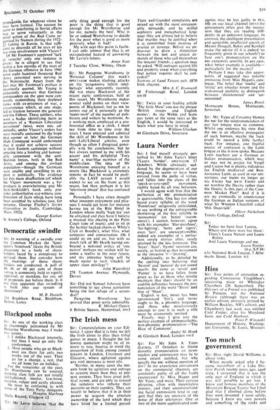Laura Norder
Sir: I find myself strangely per- turbed by Mr John Yates's letter ('Laura Norder'. SPECTATOR 17 October). While obviously sad- dened by the degeneration of our language, he seems to have been enticed from the paths of virtue, and fallen into the claws of the
'speak-as-you-spell' movement, rightly hated by all true believers. 1 would agree with him that the perfection of BBC pronunciation is questionable. One has too often heard every syllable of the word 'Pontefract' religiously articulated, to say nothing of the unforgivable shortening of the first syllable in 'economics' (or better 'oecon- omics'). I cannot, however, agree with his examples. 'Har-purchase'. 'far-fighting', 'lams and tigers'; even 'Lars', are unexceptionable; indeed are examples of a perfec- tion sorely striven after, rarely attained by the less fortunate. The 'hiyer'. 'flyer', liyons' versions are, surely, as horrid as that monument to the intrusive 'r'—'droring'.
Additionally, to be deluded by the spelling into believing that 'Severn' and 'pattern' do not sound exactly the same as 'seven' and 'Patten' is to have fallen from grace as far as those who stoutly maintain that there should be an audible difference between the pro- nunciation of the word "Shore' and that of 'Shaw'.
English is not, never has been (pronounced 'bin'), and never ought to be, a phonetic language, and those who mischievously attempt to cast it in such a role must be strenuously resisted. • Finally, may I give you the perfect example of unimpeachable, non-phonetic pronunciation--"The Hice of Commons'. Andre M. Hook 46 Glenloch Road, London taw3 Sir: For Mr John A. Yates (Letters, 17 October) to blame slovenly pronunciation on news- readers and announcers may be to some extent justified, but why specify the BBC without mention of rrv? In my experience announcers on the commercial channels are constantly guilty of all the faults enumerated by Miss Hagan and Mr Yates, and more. Their curious Phrasing, often with meaningless stresses, and their uncomprehend- ing facial expressions tend to sug- gest that they are unaware of the sense of their utterances. One or two of the more sophisticated com- panics may be less guilty in this, brit on our local channel (trry) the announcers often give the impres- sion that they are reading diffi- dently in an unknown language. In contrast, the intelligent presentation and agreeable, unaffected speech of Messrs Dougall, Baker and Kendall make the advice (if it is indeed 'so frequently given in our schools') to base one's pronunciation on the sac extremely sensible. In any case, what better example is available— particularly for the masses?
Perhaps I may take this oppor- tunity of suggested two notable omissions from Miss Hagan's cata- logue. The belief that 'media' and 'strata' are singular nouns and the widespread inability to distinguish between 'disinterested' and 'un- interested'.
James Brock Montacute House, Montacute, Somerset.
Sir: Mr. Yates of Coventry blames the sac for the mispronunciation of our fair tongue now so common. Whilst one endorses his view that the sac is an effective propagator of such horrors, maybe the buck could be passed a little further back. For instance, one fruitful source of confusion is the Latin tongue as she is now spoke. Because Latin teachers use a German or Italian pronunciation, which may or may not be proper for Vergil and Cicero but is plainly ridiculous for English mediaeval and Ren- naissance Latin. as used in our uni- versities. our trains no longer go via Exeter but we-ir Exeter and we worship the Dayity rather than the Deeitv. Is this part of the Com- mon Market Plot? And if it is are we eventually to countenance the German or Italian versions of what Sir Winston Churchill called 'this Dago-talk'.
Oliver Nicholson Trinity College, Oxford Sir: Today we have four Lauras, Where erst there were but three: There's Laura Nature and Laura Biding And Laura Vaverage and me.
Laura Norder (p-p. S.F.H) c/o National Book League, 7 Albe- marle Street. London wl










































 Previous page
Previous page